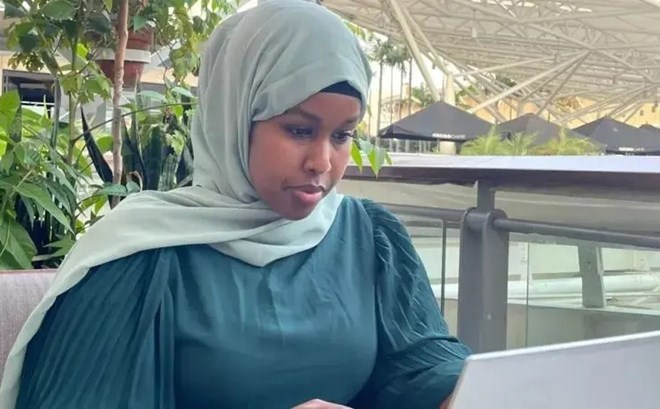
Friday October 4, 2024

Hamda Rageh, a Somali student in Beirut, remains focused on her studies despite the challenges of being stranded in the conflict-stricken Lebanese capital.
Mogadishu (HOL) — As Israeli airstrikes intensify across Lebanon, hundreds of Somali students find themselves trapped in Beirut, unable to flee amidst the chaos. The bombings, primarily targeting Hezbollah strongholds, have devastated the Lebanese capital, killed thousands, and severely disrupted essential infrastructure.
The situation for Somali students, alongside thousands of other foreign nationals, has become increasingly dire as flights are grounded and evacuation routes are blocked. A major Israeli airstrike in eastern Lebanon, near the Syrian border, left a 12-foot-wide crater, cutting off a critical road used by evacuees attempting to escape the escalating conflict. Lebanese Transport Minister Ali Hamieh confirmed the damage, which has complicated efforts to flee the embattled country.
Hamda Rageh, a Somali student in Lebanon, described the bleak situation. "There's only one airline operating, and it only flies within the Middle East. All other international flights have been suspended," she told the BBC Somali Service. Hamda has been stuck in Beirut and cannot leave due to the unavailability of flights.
Beirut's international airport has been a frequent target, with massive explosions lighting up the sky as Israeli warplanes carry out raids near Hezbollah strongholds. The airstrikes intensified after the group's leader, Hassan Nasrallah, was killed last Friday. Israeli forces are now targeting the group's potential successor, Hashem Safieddine. While Lebanese citizens have fled en masse, foreign nationals, including students, face additional challenges in securing transportation out of the country.
While some countries, like Tunisia, have deployed helicopters to evacuate their citizens, most foreign students, including Somalis, remain trapped.
The conflict has already claimed over 1,500 lives in Lebanon, with Lebanese officials reporting 37 deaths and over 150 injuries on Thursday alone. More than one million people have been displaced, leaving the country on the brink of a humanitarian disaster. Hezbollah, which still retains vast stockpiles of missiles and tens of thousands of fighters, has responded by launching 230 projectiles into Israel.
Iran's involvement has intensified the regional conflict, with the country launching 200 ballistic missiles at Israel in retaliation for a previous strike on Tehran and recent strikes on Hezbollah.
The international community has voiced growing concerns over the potential for a prolonged conflict. The Group of Seven (G7) nations have called for "restraint" among the warring sides and warned of an "uncontrollable escalation" in the Middle East. Despite these calls, the situation continues to worsen, with fears that Israel could become embroiled in a quagmire similar to its 1982 invasion of Lebanon, which lasted 18 years.
Essential services, including electricity and internet access, have been severely disrupted, making it nearly impossible for students relying on online education to continue their studies.
Rageh expressed concerns that the situation will only worsen as the conflict between Israel and Hezbollah escalates. "People are terrified that this will turn into something much bigger than the 2006 conflict between Hezbollah and Israel."